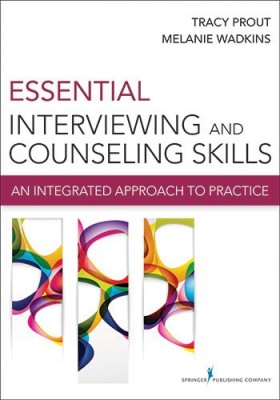 Essential Interviewing and Counseling Skills is a helpful resource for facilitating an understanding of integrative counseling methods. Moving beyond theory, this book not only explains the relevance of integrative methods, but also fosters the application of an integrative approach. The book is divided into four sections which incrementally guide the learner in developing essential knowledge and skills. Titled “Building the Foundation,” the aptly named first section provides important aspects of interviewing, ethics, case conceptualization, selecting interventions and diversity issues. After acquiring foundational skills, the reader is prepared to transition to learning the importance of developing a counseling relationship. In this segment, the reader learns core counseling concepts such as reflecting, conveying empathy and strengthening the therapeutic alliance. The third section assists the learner in connecting with the client and promoting change. Within the areas of assessment, diagnosis and treatment planning, the authors provide the reader with expansive insight into goal setting, wellness, emotionality, the nature of the therapeutic relationship and helpful techniques. The final section concludes with termination considerations for a variety of counseling modalities such as group, school, career, family and forensic counseling. Additionally, the authors highlight methods of crisis intervention and suicide prevention.
Essential Interviewing and Counseling Skills is a helpful resource for facilitating an understanding of integrative counseling methods. Moving beyond theory, this book not only explains the relevance of integrative methods, but also fosters the application of an integrative approach. The book is divided into four sections which incrementally guide the learner in developing essential knowledge and skills. Titled “Building the Foundation,” the aptly named first section provides important aspects of interviewing, ethics, case conceptualization, selecting interventions and diversity issues. After acquiring foundational skills, the reader is prepared to transition to learning the importance of developing a counseling relationship. In this segment, the reader learns core counseling concepts such as reflecting, conveying empathy and strengthening the therapeutic alliance. The third section assists the learner in connecting with the client and promoting change. Within the areas of assessment, diagnosis and treatment planning, the authors provide the reader with expansive insight into goal setting, wellness, emotionality, the nature of the therapeutic relationship and helpful techniques. The final section concludes with termination considerations for a variety of counseling modalities such as group, school, career, family and forensic counseling. Additionally, the authors highlight methods of crisis intervention and suicide prevention.
In accordance with integrative practice, the writers provide a distinctive section that assists the learner in developing a unique counseling style. The format of the book emphasizes the essentiality of continued education and notes the importance of professional development via conferences, workshops, seminars, certifications, networking, supervision and self-care. The seamless progression of this book from chapter to chapter is helpful in utilizing a developmental teaching perspective in counselor education. The authors provide case examples and multicultural perspectives throughout the text to assist in the learning process. In addition, skill boxes with learning exercises, resources and reflections are sprinkled throughout the book, which aid in threading the learned material into practice. Furthermore, several of these skill boxes include web applications through which the reader can venture beyond the text.
The authors certainly achieve their intention of providing knowledge in a manner that is easily accessible to a beginning audience. The range of information from acquiring basic skills to integrating methods makes this book suitable for the counseling trainee, novice counselor or clinician seeking guidance in expanding and integrating practice. The skills-focused, reflective style of this text may also be helpful to the experienced counselor looking for fresh approaches to counseling. Chapters are equipped with reviews, personal reflections, keywords and suggestions for further reading that may assist the counselor educator in developing or facilitating training courses. On the other hand, due to the skills-focused approach, this text may be insufficient for training courses that aim to encompass the depth of counseling theories. Overall, the authors provide a wealth of information to assist in counseling training. Students in counseling training programs will find Essential Interviewing and Counseling Skills a helpful guide in expanding their clinical toolbox.
Prout, T., & Wadkins, M. (2014). Essential interviewing and counseling skills: An integrated approach to practice. New York, NY: Springer.
Reviewed by: Shainna Ali, doctoral student in counselor education, University of Central Florida, Orlando, FL.
The Professional Counselor
https://tpcwordpress.azurewebsites.net
